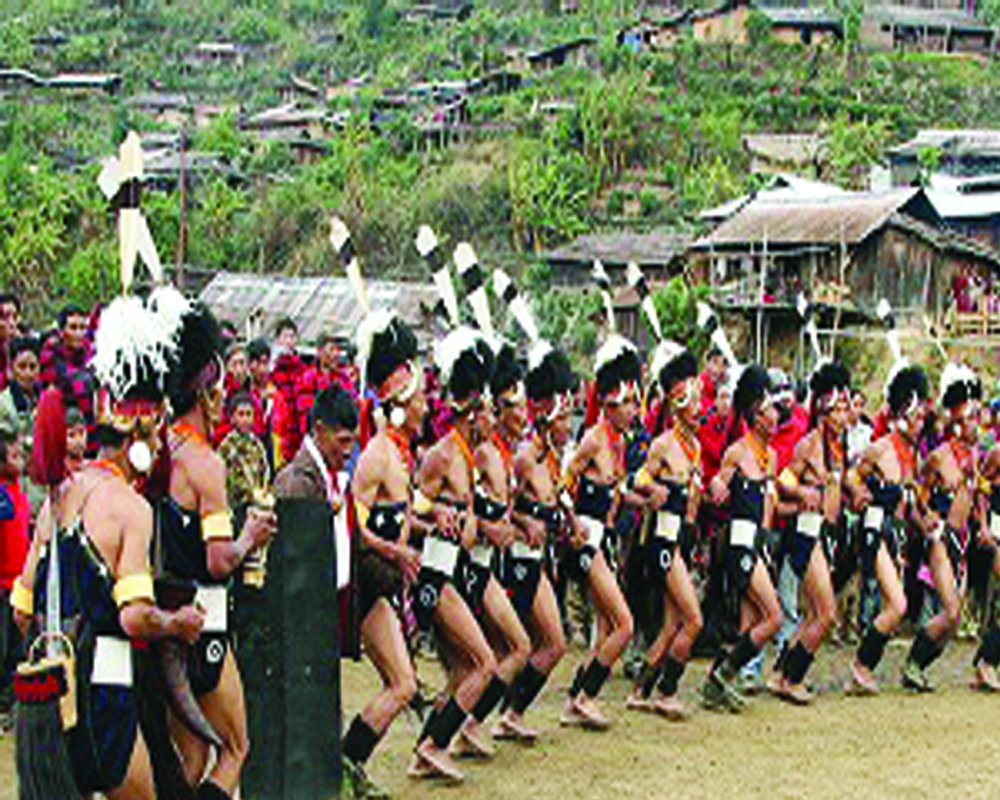The spillover of the Naga insurrection into the hill districts of Manipur has significantly altered the security scenario of the State
A mistake was made in the past. A former Prime Minister of India, inadvertently advised by ill-informed pundits, “proclaimed” a unique history for an assemblage of peoples that never had a uniformed code of existence. Indeed, it was only with the advent of the colonial rulers and in their yoke the missionaries that an alien faith was premeditatedly administered. It was this, by most intent and purposes, which sowed the seeds of discord as well as dissonance from a nation state that had sought to embrace the Naga people when the British left the Indian shores.
Notwithstanding the belligerence with which Thuingaleng Muivah and his cadres have sought to foist flag and the Constitution on to a dialogue impasse, the fact of the matter is that the Tangkhul chieftain from Somdal has stalemated a process that could have concluded in detente. It is wondered whether there was more to the impasse than mere seeking of a gubernatorial ouster. Many a quarter has reckoned the removal as less than appropriate. However, it may be countenanced as an act of magnanimity of a nation that has not only imbibed a civilisational imperative that has embraced countless hues and faiths but have housed novel usage into its overarching approach. Such has been the manner in which is the Indian state has sought, known and incepted its people.
But how should one proceed with the Naga dialogue? It cannot be without taking into account the aspirations of the peoples of Assam, Arunachal Pradesh and Manipur. In 2001 when a thoughtless process sought “extension of the ceasefire” without territorial limits it brought about mayhem in the region including the burning down of the Manipur Assembly building by a people that rightfully felt that a grave injustice had been perpetrated. The spill over of the Naga insurrection into the hill districts of Manipur has significantly altered the security scenario of the state. In its quest for a Greater Nagaland, NSCN (IM) is elbowing itself into parts of Assam, Arunachal Pradesh and Manipur.
However, Manipur constitutes a special case for the Naga insurgent organisation as Ukhrul-one of the nine districts of Manipur-is home to NSCN (IM) general secretary, Muivah, and he deems it an imperative that he incorporates the Naga inhabited parts of Manipur and particularly the Tangkhul Naga (of which community he is a member) areas into Nagalim. After all, what would he have to answer to his brethren in Somdal if he were not to achieve the end objective? To that end, large tracts of Ukhrul, Chandel, Senapati and Tamenglong districts continue to be in the cartographical sights of Muivah, who like Napoleon (a Corsican), has to do more were he to continue to retain both legitimacy and power within NSCN (IM).
A few pointers are provided for a new direction to the Naga talks:
First: The Naga people of the present territory of the state of Nagaland do not countenance the so-called Nagas of Manipur as their own and reliable reports have stated that they would be happy without the inclusion of the territories of other states into their autonomous Nagaland.
Second: The question of a separate flag and constitution for Nagaland cannot be accepted by the Indian state.
Third: The NSCN (IM) must be clearly informed that the vehemence with which it seeks to silence criticism in the region would not be tolerated. Political assassinations such as the one of former president of Zeliangrong Baudi, Athuan Abonmai in Tamenglong district would, the Naga group, must be stopped.
Fourth: New Delhi, in its wisdom, has sought the good offices of Assam Chief Minister to reach out to the NSCN (IM). The strategy is both novel and pragmatic. This is especially true because the credentials of the personage who has been vested with the duty. However, it is also recommended that people like Mizoram Chief Minister Pu Zoramthanga, too, be brought in for consultation.
The Narendra Modi government simply has to showcase success on the question of the Nagas. A speedy and comprehensive resolution to the longest running insurgency would not only open the floodgates for the bring-to on board of other insurgent groups, but would usher in an opportunity for economic fillip that the region hungers for.
The people of the North East have to be incorporated into the nation-building exercise and the greater Indian dream. New Delhi's ability to correctly integrate the “enchanted frontiers” rests considerably on such an accomplishment. The success of the Naga talks would be the first step in that direction.
(Desai is an Anthropologist and a conflict analyst with specialisation in the north-east region. Saikia is a bestselling author and a conflict analyst. The views expressed are personal.)

























